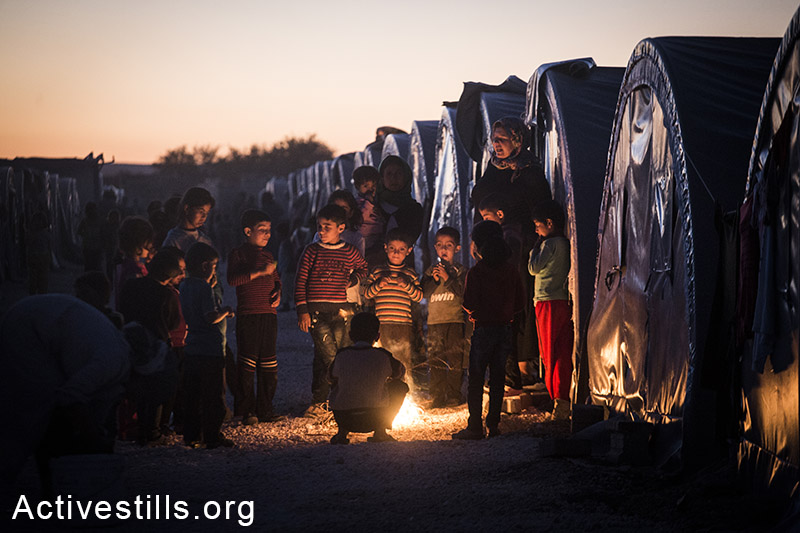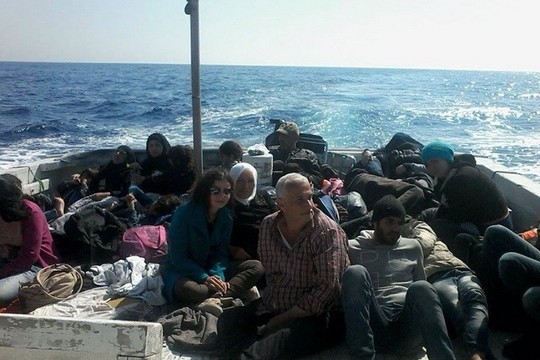Dozens of bodies are found in a refrigerated truck in Austria, while hundreds wash up on the shores of Libya and Italy. As the refugee crisis hits unprecedented levels, in Israel it’s business as usual.
“Mother, I am sorry that I was not rescued and drowned. Forgive me for all the loans you took out so that I could escape like the other young people. I am sorry that I won’t send 50 euro every month to my brother like I promised. Don’t look for me, mother, you don’t have the money for burying my body. I am thankful for the sea for opening its heart and letting in my body without an entry permit or passport. I am also thankful for the fish that enjoyed eating my flesh without asking who I am, which religion I belong to, or what my ethnic background is.
“Dear fishermen and divers, I do not know where I drowned or where you will find me, but it is clear that I will no longer be a burden on any of the immigration authorities. The news broadcasts will dedicate two minutes to my death, and thats’s it — I will disappear.”
These words were written by a young Syrian man whose body was found at sea.
Death in the back of a truck
I cannot get the images of Syrian refugees who fled their country out of my mind. I do not stop myself from searching for more details, photos, or stories from these endless journeys of death. There is not one story that does not include the words “Palestinian-Syrians” or “Syrian-Palestinians.”
The Israeli media mostly refrains from reporting on the humanitarian disaster that’s keeping the world busy, preferring to keep the Jewish People terrified of the asylum seekers recently released from Holot detention center. How can one ignore horrifying incidents, such as the 71 refugees who died in the back of a refrigerated truck on the border of Austria, or the 50 bodies that washed up on the shores of Libya, or the hundreds who drowned somewhere between Italy and Greece? How can one remain indifferent to the photos of thousands of refugees trying to cross into Macedonia and other countries on their way to Germany, the Netherlands, Denmark, or Sweden?
This summer I stopped waiting around to find out whether any of the victims were refugees from Sajara — my family’s village. At a certain point the question loses meaning, and very quickly any allegiance to a Syrian city, a small village, or a refugee camp such as Yarmouk, wash away in the salty sea, leaving behind helpless human beings who struggle against the waves until their very last breath.
Every day brings with it different horror story that refuses to end. Desperation has led many of my family members and friends have stopped keeping track. Others share these stories on Facebook, trying desperately to shock their friends, sometimes adding “may God help them,” or “shame on those traitorous Arab countries.”
Our virtual village includes photos of flowers, blessings for survivors, and articles about missing persons. This month broke the all-time record with the video of the father holding his two children and swimming toward the shore, encouraging his children: “We’ve made it, just a bit more and we’re there. We’re saved, father, we’re saved. One day you will tell the entire world, about the day which all the borders of the Arab world were closed to us and we came here.”
And then came the photos of the violent arrest of a Syrian family on the border of Hungary followed by the story of the death truck. And if that wasn’t enough, someone collected and put together the photos of all the children who drowned in the sea. But in all of these reports, no one is talking about the names of the dead, nor about the end of the fighting. It is unclear whether Assad will fall, or what will happen in Syria with Islamic State and other groups. It seems the war will only end only when the last Syrian is either murdered or flees.
Refugees not welcome
Every single neighboring country — Jordan, Lebanon, and Turkey — is full of refugees. These countries have began complaining about the burden of hundreds of thousands of refugees who are looking for work. Educated men are cleaning the streets of Jordan, the “new Chinese” are building Amman, talented artists take part in street bands on the streets of Istanbul, and young Syrian women have become the sex slaves of the Arab world.
The Western world puts on conferences and provides assistance — which is never actually enough — to these countries. Everyone gets involved, somehow.
Only one country totally ignores what is happening in the neighborhood: Israel. Here and there we hear about assistance to Syrians fighting against ISIS, we hear about the wounded Syrians who were hospitalized in northern Israel, and following the lynch on the ambulance by Druze citizens, Israel can no longer deny its involvement in Syria.
And me, the naive woman who looks on from the side, thinks: Why does Israel act like a spoiled child in the kindergarten of the Middle East? Who gave it an unlimited pass from taking responsibility? Why must millions of Syrian refugees leave their war-torn country, through the death journeys to Europe, while in Israel it’s business as usual.
The same Germany that murdered Jews 70 years ago learned its lesson and has opened its arms to foreigners from Syria. It absorbs refugees despite internal dissent and the difficult economic burdens it must carry. Meanwhile, the same country of refugees based on the story of Jewish oppression and the right to a safe place continues to abuse anyone who isn’t Jewish, such as Darfur refugees, victims of ethnic cleansing in Africa, and migrant workers.

I am sure that the idea to establish a UN-run zone for refugees in the Golan Heights (which is considered occupied Syrian territory according to international law) will likely shock some of you.
Syria itself absorbed several thousand refugees from the 1948 war, including most of my family. In 1923, thousands of refugees from Greece arrived in boats on the shores of Syria. Think about how many Jews immigrated to the United States, Australia, and South Africa after World War II. This is what happens to innocents in wars.
Perhaps one day the world will settle the score with Israel’s indifferent stance toward the Syrian war. Perhaps we will one day speak of Israel’s role in shouldering the burden of the Syrian crisis.
Something to gain
A state in the heart of the middle east, one with a majority of citizens made up of people who fled their home countries due to racism and anti-Semitism, has caused a catastrophe for Palestinians, turning most of them into eternal refugees. Seventy years later, this very state acts like it has landed here from a different planet, and couldn’t care one bit. As long as Jews aren’t in trouble, the world can keep on burning. Who will forgive Israel and help it in its time of need? And who will believe in the humanity of “the only democracy in the Middle East” when it turns a blind eye to what is happening?
If Israel builds refugee camps in the Golan, it will know how to make the best of it: it will be able to clear its name of wrongdoing, raise money, and make diplomatic gains that Danny Danon, Israel’s newly-appointed ambassador to the UN, will never be able to make. What the Israeli government fails to understand is that there is no such thing as an ethnically or religiously pure country in the world.
The “Start-Up Nation” knows that we live in a giant global village, and there is no way to live in a bubble protected by Iron Dome. Not while the world outside is on fire.
This article was first published in Hebrew on Local Call. Read it here.




